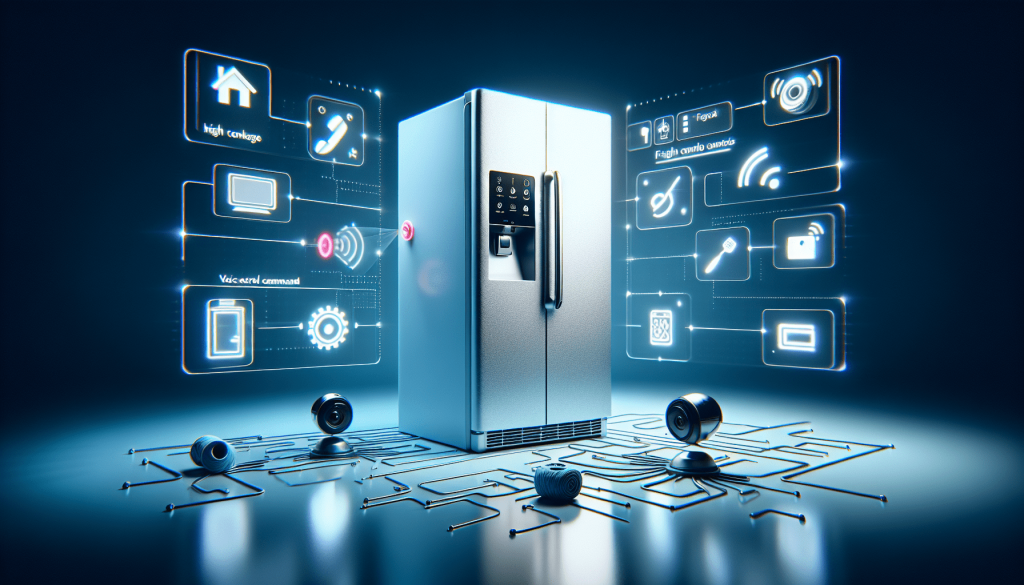Imagine having a fridge that not only keeps your food fresh but also connects to the internet and enhances your kitchen experience. Smart fridges are becoming increasingly popular, but are they really worth the investment? In this article, we will explore the pros and cons of smart fridges, allowing you to make an informed decision about whether these futuristic appliances are the right fit for your home. So, let’s dive in and discover if smart fridges are worth it for you!

Overview
Definition of a smart fridge
A smart fridge is a technologically advanced appliance that has the ability to connect to the internet and perform a range of functions beyond the capabilities of a traditional refrigerator. It is equipped with sensors, cameras, and various connectivity features that allow users to access information about their fridge’s contents, manage food inventory, and even order groceries.
Features of a smart fridge
Smart fridges come with a wide range of features that enhance their functionality and convenience. These features include but are not limited to:
-
Touchscreen display: Smart fridges are equipped with a touchscreen display that provides easy access to a variety of functions and information. It allows users to control various settings, view the contents of the fridge, set expiration dates, and even watch tutorials on cooking.
-
Camera system: Smart fridges are fitted with internal cameras that capture images of the fridge’s interior. These images can be accessed remotely through a smartphone or tablet, allowing users to check the contents of their fridge while they are at the grocery store.
-
Voice control: Most smart fridges feature voice control capabilities that enable users to interact with their fridge using voice commands. This eliminates the need for manual operation and enhances convenience.
-
Wi-Fi connectivity: Smart fridges can connect to the internet, enabling them to receive software updates, sync with other smart devices, and access various online services.
-
Mobile apps: Manufacturers often provide mobile apps that allow users to control and monitor their fridge’s functions remotely. These apps enable users to view inventory, receive notifications, and even place grocery orders.
Advantages
Convenience and efficiency
One of the key advantages of a smart fridge is the convenience it offers. With features like voice control and remote control via mobile apps, you can easily manage and interact with your fridge without even having to be in the kitchen. This can be particularly useful when you need to check what groceries you have while you’re at the store or when you want to quickly adjust the temperature settings without physically being near the fridge.
Additionally, smart fridges excel in efficiency. They are equipped with advanced temperature and humidity control mechanisms, ensuring optimal food storage conditions. This helps to keep your food fresh for longer and reduces the chances of spoilage, thereby minimizing wastage.
Advanced technology and connectivity
Smart fridges incorporate cutting-edge technology and connectivity features, revolutionizing the way we interact with our kitchen appliances. With Internet of Things (IoT) integration, these fridges can communicate with other smart devices in your home, creating a seamless and connected experience. For instance, you can receive notifications on your smartphone if the fridge door is left open or if the temperature inside exceeds a certain threshold.
Food management and organization
Another significant advantage of smart fridges is the ability to manage your food more effectively and stay organized. Inventory tracking features allow you to keep tabs on what’s inside your fridge, making it easier to plan meals and reduce food waste. Some smart fridges even provide the option to input expiration dates for different items, ensuring that you consume them before they go bad. Additionally, smart fridges can suggest recipes based on the ingredients you have in stock and even track the nutritional value of your meals.
Disadvantages
Higher cost
One of the main drawbacks of smart fridges is their higher cost compared to traditional refrigerators. The advanced technology and connectivity features add to the manufacturing costs, making smart fridges more expensive to purchase upfront. However, it’s essential to consider the long-term benefits and savings that smart fridges offer, such as reduced food waste and energy efficiency.
Complex setup and maintenance
Smart fridges typically require a more intricate setup process compared to their traditional counterparts. You may need to connect the fridge to your home’s Wi-Fi network, install software updates, and set up user profiles. This complexity can be daunting for some users, especially those who are not particularly tech-savvy. Additionally, regular maintenance and software updates are necessary to ensure optimal performance, which may require some technical knowledge.
Privacy and security concerns
With the extensive connectivity and data collection capabilities of smart fridges, privacy and security concerns arise. There is a potential risk of unauthorized access to your personal data or even your home network. Manufacturers must implement strict security measures to protect user information and ensure that the smart fridge’s connectivity features do not compromise privacy.
Cost Analysis
Initial purchase cost
Smart fridges typically have a higher price tag compared to conventional refrigerators. The additional features and advanced technology contribute to the increased cost. The range of prices varies depending on the brand, model, and specific features. However, it’s important to consider the long-term benefits and potential cost savings associated with reduced food waste and energy efficiency.
Energy consumption and savings
Smart fridges are designed with energy efficiency in mind. They often feature advanced insulation materials and mechanisms that help minimize energy consumption. Some models even adjust the temperature and humidity levels based on the fridge’s contents, further optimizing energy usage. Over time, this can lead to significant savings on your energy bills.
Maintenance and repair costs
Maintenance and repair costs are an important consideration when investing in a smart fridge. While regular maintenance is typically required to ensure optimal performance, repair costs can be higher due to the complexity of the technology involved. It’s essential to research the manufacturer’s warranty and support options to understand the potential costs associated with repairs.

Technology and Connectivity
Internet of Things (IoT) integration
Smart fridges are a part of the Internet of Things (IoT) ecosystem, which allows them to connect and communicate with other smart devices in your home. This integration enables seamless automation and coordination between various appliances, creating a more efficient and interconnected living space.
Smart home compatibility
Many smart fridges are designed to be compatible with popular smart home platforms, such as Amazon Alexa or Google Assistant. This compatibility allows users to control their fridge using voice commands and integrates it into their existing smart home setup.
Mobile apps and remote control
Most smart fridge manufacturers provide mobile apps that enable users to control and monitor their fridge remotely. These apps allow you to view and manage your fridge’s contents, adjust settings, receive notifications, and even place grocery orders. The ability to control your fridge from anywhere adds an unprecedented level of convenience and flexibility to your daily routine.
Food Management and Organization
Inventory tracking and expiration dates
Smart fridges offer robust inventory tracking features that help you keep track of what’s inside your fridge. With internal cameras and sensors, they can identify the items stored and assign them to specific categories or shelves. Some models even allow you to input expiration dates for different items, ensuring that you consume them before they spoil. This level of organization makes meal planning and grocery shopping more efficient.
Grocery ordering and meal planning
Many smart fridges offer the functionality to order groceries directly from the fridge’s interface or through the accompanying mobile app. By scanning barcodes or using voice commands, you can add items to your shopping list and conveniently place an order for delivery or pickup. Additionally, smart fridges can suggest recipes based on the contents of your fridge, making meal planning a breeze.
Recipe suggestions and nutrition tracking
Smart fridges can provide recipe suggestions based on the ingredients you have in stock. By analyzing the items in your fridge, they can suggest recipes that utilize those ingredients. This feature can be incredibly helpful in reducing food waste and inspiring creativity in the kitchen. Some smart fridges also allow you to track the nutritional value of the meals you prepare, helping you maintain a balanced diet.

Convenience and Efficiency
Voice control and hands-free operation
One of the standout features of smart fridges is the ability to control them through voice commands. With built-in voice assistants like Amazon Alexa or Google Assistant, you can ask your fridge to perform various tasks, such as adjusting the temperature, checking inventory, or even reading out recipes. This hands-free operation adds an extra layer of convenience to your kitchen experience.
Automatic temperature and humidity control
Smart fridges are equipped with advanced sensors and mechanisms that monitor and adjust the temperature and humidity levels within the fridge. This automation ensures optimal storage conditions for different types of food, helping to extend their shelf life and maintain their freshness. You no longer have to worry about manually adjusting the settings or forgetting to adjust them back after retrieving an item.
Smart alerts and notifications
Smart fridges can send you real-time alerts and notifications to keep you informed about important events or changes. For example, you may receive a notification if the fridge door is left open for an extended period or if the temperature inside exceeds the recommended range. These alerts help you take immediate action to ensure the safety of your food and the optimal functioning of the fridge.
Environmental Impact
Reduced food waste
One of the significant environmental benefits of smart fridges is their ability to reduce food waste. With features like inventory tracking, expiration date reminders, and recipe suggestions, smart fridges help you plan your meals more efficiently and avoid unnecessary waste. This not only saves you money but also contributes to reducing the overall environmental impact of food production and disposal.
Energy-efficient features
Smart fridges are designed to be energy-efficient. They often incorporate features like advanced insulation, smart temperature control, and efficient compressors, which help minimize energy consumption. By choosing a smart fridge with good energy efficiency ratings, you can contribute to a more sustainable and eco-friendly lifestyle without compromising on convenience.
Sustainable packaging considerations
Some smart fridges come with features that take sustainable packaging into account. For instance, they may provide eco-friendly options for ordering groceries, such as selecting products with minimal packaging or opting for reusable containers. These considerations help promote a more sustainable approach to food storage and consumption.

Privacy and Security Concerns
Data collection and usage
Smart fridges collect various data points, such as inventory information, user habits, and preferences. While this data can enhance the functionality of the fridge and provide personalized recommendations, there are concerns about how this data is collected, stored, and used. It’s crucial for manufacturers to be transparent about their data practices and provide clear options for users to control and manage their data.
Cybersecurity threats
As with any connected device, smart fridges are susceptible to cybersecurity threats. Hackers may attempt to gain unauthorized access to the fridge, potentially compromising personal data or even gaining control of other devices on the home network. Manufacturers must prioritize robust security measures and provide regular software updates to address any vulnerabilities.
Manufacturer’s approach to privacy
When considering a smart fridge, it’s essential to research the manufacturer’s approach to privacy. Look for brands that prioritize user privacy, provide clear privacy policies, and adhere to industry best practices. Manufacturers should also offer options for users to customize their privacy settings and control the sharing of their data.
User Experience and Satisfaction
Customer reviews and ratings
User reviews and ratings are a valuable source of insight into the overall user experience and satisfaction with a particular smart fridge model. Reading customer reviews can provide valuable information about the fridge’s performance, ease of use, reliability, and customer support.
Common issues and complaints
Understanding common issues and complaints associated with smart fridges can help you make an informed decision. Look for recurring themes or problems in customer reviews and assess whether these issues are deal-breakers for you. It’s important to consider the overall consensus rather than getting swayed by isolated negative experiences.
Long-term usability and satisfaction
Considering the long-term usability and satisfaction is crucial when investing in a smart fridge. Assess factors such as the manufacturer’s reputation, warranty options, and the availability of software updates. A reliable and reputable manufacturer with a track record of providing ongoing support and updates will ensure that your smart fridge remains functional and relevant for years to come.
In conclusion, smart fridges offer a range of advantages, including the convenience of remote control and efficiency in managing food inventory. However, they come with their fair share of disadvantages, such as higher costs and potential privacy concerns. By carefully considering the features, costs, and potential benefits, you can determine whether a smart fridge is worth it for your specific needs and preferences. Ultimately, the decision to invest in a smart fridge should align with your desire for enhanced convenience, efficiency, and sustainability in your kitchen.



